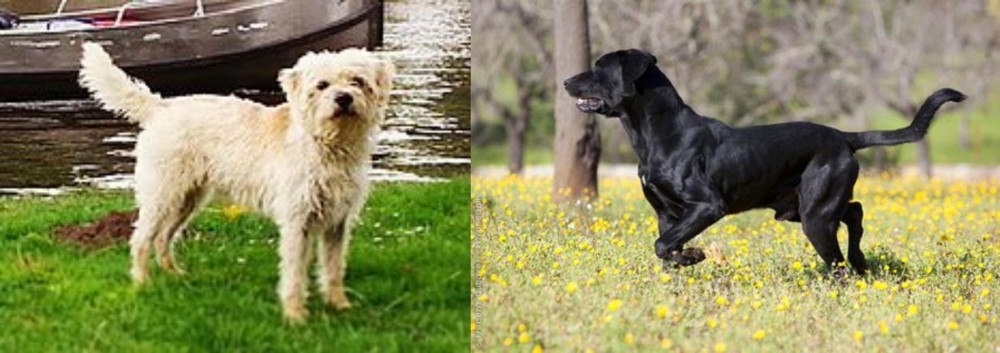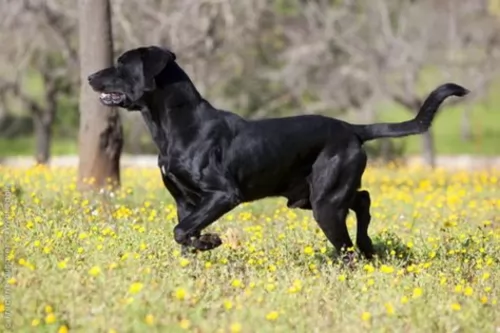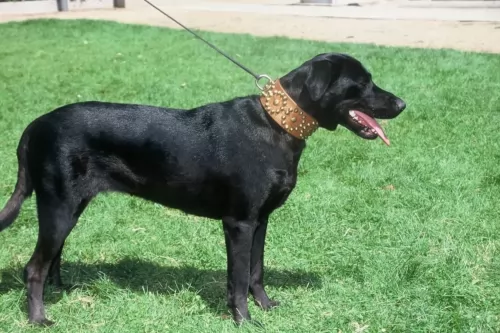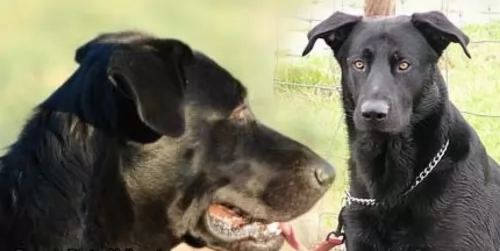 Petzlover
Petzlover Dutch Smoushond is originated from Netherlands but Perro de Pastor Mallorquin is originated from Spain. Dutch Smoushond may grow 30 cm / 11 inches shorter than Perro de Pastor Mallorquin. Dutch Smoushond may weigh 29 kg / 63 pounds lesser than Perro de Pastor Mallorquin. Both Dutch Smoushond and Perro de Pastor Mallorquin has almost same life span. Both Dutch Smoushond and Perro de Pastor Mallorquin has same litter size. Both Dutch Smoushond and Perro de Pastor Mallorquin requires Moderate Maintenance.
Dutch Smoushond is originated from Netherlands but Perro de Pastor Mallorquin is originated from Spain. Dutch Smoushond may grow 30 cm / 11 inches shorter than Perro de Pastor Mallorquin. Dutch Smoushond may weigh 29 kg / 63 pounds lesser than Perro de Pastor Mallorquin. Both Dutch Smoushond and Perro de Pastor Mallorquin has almost same life span. Both Dutch Smoushond and Perro de Pastor Mallorquin has same litter size. Both Dutch Smoushond and Perro de Pastor Mallorquin requires Moderate Maintenance.
 The Dutch Smoushond, known also as the Hollandse Smoushond ,Hollandse Herdershond
The Dutch Smoushond, known also as the Hollandse Smoushond ,Hollandse Herdershond
or Dutch Ratter is a small to medium sized dog. The Smoushondenclub was formed in 1905 as it was thought that the breed was dying out and they wanted to register the dog as a purebred breed.
It is believed that the dog’s origins may have to do with the Schnauzer breed. It was in 1973 that a number of breeders looked to reconstruct the breed, using Border Terrier crosses.
Today this rare breed is popular in the Netherlands, but not particularly well known anywhere else. In 2001 it was recognized by the Federation Cynologique Internationale as well as by the United Kennel Club in the United States.
Although the dog was once a skilled ratter, most Dutch Smoushond are kept as companion dogs.
 Known also as the Majorca Shepherd Dog or Ca de Bestiar, the very name Perro de Pastor Mallorquin means Shepherd dog of Mallorca.
Known also as the Majorca Shepherd Dog or Ca de Bestiar, the very name Perro de Pastor Mallorquin means Shepherd dog of Mallorca.
The dog hails from Spain and has been used as a general purpose farm dog. The diligent work of fans of the dog to encourage its development were rewarded when the dog - both short- and long haired varieties - gained recognition from the Fédération Cynologique Internationale.
The dog is really only popular in its homeland where it is appreciated for its guarding and herding abilities.
 The Dutch Smoushond is a small to medium sized dog breed related to the Schnauzer- and Pinscher breed. He stands at about 35 to 43cm at the withers and weighs about 10kg.
The Dutch Smoushond is a small to medium sized dog breed related to the Schnauzer- and Pinscher breed. He stands at about 35 to 43cm at the withers and weighs about 10kg.
He has a rough, shaggy, wiry coat which is waterproof and which is a yellowish or straw color. You’ll notice that the hair around the face is long and fairly straight and forms a beard, eyebrows, and moustache, giving him wise, know-it-all look.
The forelegs are also feathered. He may well give the impression of being ungroomed and untidy with his different length hair. He has floppy ears, the eyes are small and dark, the nose black and the tail is long and feathery, hanging limply when the dog is relaxed.
Easy going, friendly and social, the Dutch Smoushond is a fairly quiet dog, but because he is intelligent and alert, he makes a good watchdog.
When not guarding you, he is cheerful and entertaining. He is an adaptable dog, being able to settle down to life in the city or in the countryside, getting on well with other pets in the home as well as with children.
He is a dog who wants to please, so training him isn’t going to prove difficult. He’ll do well with this training as well as socialization as he becomes obedient, easy-going and relaxed around strangers.
 The Perro de Pastor Mallorquin is a large dog which stands between 62 and 73 cm and weighs between 35 and 40kg. Most of them are short haired, ensuring low grooming requirements for the owner. The coat is black, in fact the Fédération Cynologique Internationale says its the only color which is acceptable. He has floppy ears and the tail is long, rising when the dog is on the move.
The Perro de Pastor Mallorquin is a large dog which stands between 62 and 73 cm and weighs between 35 and 40kg. Most of them are short haired, ensuring low grooming requirements for the owner. The coat is black, in fact the Fédération Cynologique Internationale says its the only color which is acceptable. He has floppy ears and the tail is long, rising when the dog is on the move.
The Perro de Pastor Mellorquin is a dominant, independent and wilful dog that will need to be trained and socialized if he is to be obedient. He is fiercely devoted to his owner, being loving and protective. This training is actually important as the Majorca Shepherd Dog doesn't take easily to strangers and can in fact show signs of aggression when around them.
It is qualities like this that make him a good guardian and watchdog. With training and socialization he will be able to get on well with other pets in the home as well as with children who have been taught how to respect- and be kind to animals.
He is an active dog too and it is better to have such a dog in the suburbs or the countryside as opposed to living in a small city property.
 The Dutch Smoushond, also known as the Dutchie, Dutch Ratter or Dutch Terrier may once have been used as a vermin hunter, but today this terrier dog shares some of the characteristics of the more popular terriers. He may have been a hunter in his day, but more recently he is used as a reliable companion dog.
The Dutch Smoushond, also known as the Dutchie, Dutch Ratter or Dutch Terrier may once have been used as a vermin hunter, but today this terrier dog shares some of the characteristics of the more popular terriers. He may have been a hunter in his day, but more recently he is used as a reliable companion dog.
He tends to be a bit of a barker, particularly when he isn’t getting attention.
He gets on well with other animals in the home as well as with children, but he will need to be trained and socialized. He is lively, friendly and social and is a dog who becomes devoted to his human family.
 The Perro de Pastor Mallorquin is a dog known for its devotion to its owner, taking on his role as guardian and protector very seriously.
The Perro de Pastor Mallorquin is a dog known for its devotion to its owner, taking on his role as guardian and protector very seriously.
It is a courageous dog, strong willed and confident and isn't recommended as a first choice of dog for the novice dog owner, although there have been first-time dog owners who bring their dogs up correctly and have tremendous success with them.
Provide your dog with a firm consistent, kind, patient and loving home, and you can also be one of those first-time dog owners who highly recommend this dog as an awesome pet for any household.
 These dogs are a healthy breed, but nonetheless there are are some health problems that can crop up occasionally.
These dogs are a healthy breed, but nonetheless there are are some health problems that can crop up occasionally.
Ear- and eye infections and joint problems are always a major concern, even in young dogs. Bad diet, old age and being overweight can all contribute to your dog developing joint pain. Joint pain symptoms can include -
difficulty with sitting or lying down
limping or even holding a leg up off the ground
lethargic to take part in any activities
Take your pet to the vet who will examine your pet and perhaps request x-rays.
 A dog can live a long, happy life when he has been looked after well. Makig sure he doesn't become obese, giving him enough exercise and loving him can ensure longevity. Your Perro de Pastor Mallorquin can live to be 13, 14 or 15 years of age, but there are always some common dog illnesses to be aware of -
A dog can live a long, happy life when he has been looked after well. Makig sure he doesn't become obese, giving him enough exercise and loving him can ensure longevity. Your Perro de Pastor Mallorquin can live to be 13, 14 or 15 years of age, but there are always some common dog illnesses to be aware of -
This is a disease of the hip where the ball and socket joint isn’t formed properly. The result is a joint that rubs as opposed to sliding smoothly. This is one of the most common skeletal diseases in dogs seen more often in large dogs. The disease can start while the dog is still young and it can lead to osteoarthritis an decreased activity.
One of the eye diseases is when the uvea of the eye becomes inflamed, creating a painful condition known as anterior uveitis or inflammation of the front of the eye.
This disease can threaten your dog’s vision. It is painful with redness of the eye, there could be a discharge too as well as excessive watery eyes. Cancer, infections and injury can all be to blame and your vet will want to examine your dog.
 The Dutch Smoushond is basically an easy care breed, and it won’t do to try and tame the coat as the dog has a naturally unkempt look.
The Dutch Smoushond is basically an easy care breed, and it won’t do to try and tame the coat as the dog has a naturally unkempt look.
You can brush him twice a week to keep the coat free of matting and to remove loose hairs. The Dutch Smoushond may require the hair being plucked and a professional groomer can do this.
At the same time, the groomer can remove excess hair from the ears and also clean your dog’s teeth. This is of critical importance as bad teeth can lead to a host of health problems.
Get into the habit of brushing your pet’s teeth 2 or 3 times a week, making use of special pet approved toothbrush and toothpaste.
 The Majorca Shepherd Dog isn't a heavy shedder but still, he will require some basic grooming such as brushing the coat twice a week to remove loose hairs and to retain his natural shine.
The Majorca Shepherd Dog isn't a heavy shedder but still, he will require some basic grooming such as brushing the coat twice a week to remove loose hairs and to retain his natural shine.
Other care and grooming routines for your pet are to check inside his mouth for dental disease as problem teeth can cause a host of diseases in the body.
Check inside his ears too and make sure they aren't red and itchy as this could be indicative of an ear infection.
Nail clipping is also important as his nails can hook onto things and rip open the flesh around the paw area.
These dogs are lively and energetic, having been used to do lots of work herding and guarding sheep. He isn't a dog to be left in the backyard day after day without human inter-action and exercise. He will require some hectic exercise every day and will love to join you with your jogging or cycling, running beside you. Take him with you on our walks and hikes.
Only the best dog food is recommended for this dog of yours. If you intend feeding your pet commercially manufactured food, make sure its the best quality ones – those with protein listed at the top of the ingredient list and with a good amount of vitamins and minerals.
Choose the food according to your dog's size, his age and his energy levels. If you're going to give your pet home-made food, keep it simple to avoid upset stomachs and vet's bills.
Boiled chicken, brown rice or pasta and cooked vegetables such as spinach, sweet potato and carrots are wonderful for a dog when added into the kibble occasionally as a tasty treat. You can also try to include some raw meat into the kibble from time to time.
Dog's just want simple, wholesome foods like this, no unpleasant surprises of spicy, 'people foods'. Never leave your pet without a supply of fresh, cool water.
Take your puppy to the vet to have his vaccines, as the canine parvo-virus (CPV) infection for instance, isn't only a very contagious viral illness that affects dogs, it can be a killer. Keep a check on your adult dog too and see that he gets to the vet at any sign of illness.